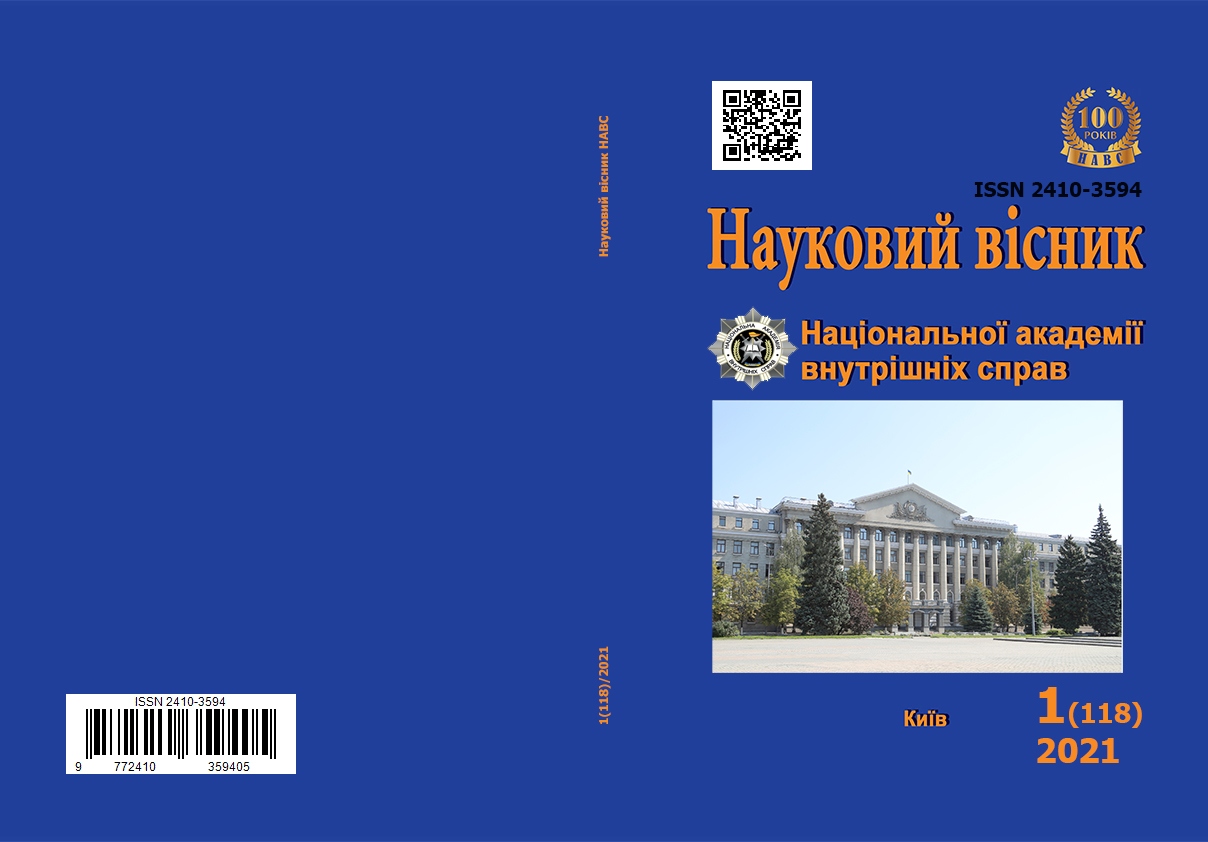Criminological Determinants of Intellectual Property Crimes
Abstract
The purpose of this article is to study the theoretical and applied aspects of the determination of intellectual property crime. Methodology. Methodological tools are selected in accordance with the purpose, specifics of the object and subject of research. In the process of research specific sociological methods were used, a sample study of criminal proceedings and court decisions was conducted. Generalization, processing and analysis of the obtained results are carried out. The comparative legal method was used in the analysis of current legislation and international regulations; statistical – for the processing of empirical data and in the process of studying statistical material in order to develop a mathematical basis. A special research method used in the article is the method of system analysis. The scientific novelty of the publication is that it outlines the problematic issues of determining crime in the field of intellectual property. Conclusions. The article offers the data of criminological research, which allowed to identify the determinants that affect the commission of criminal encroachments on intellectual property. Among the reasons for the low level of protection of intellectual property rights in Ukraine are improper supervision of compliance with the law by the state, lack of qualified specialists in this field, low level of legal culture, lack of proper knowledge and information on intellectual property protection. The determinants of crimes in the field of intellectual property are divided into four groups, in particular, economic, organizational and managerial, political, socio-psychological. The main problems that need to be solved to minimize the causes and conditions of infringements in the field of intellectual property have been identified. As a result, it becomes possible to develop effective measures to prevent crimes in this category.
Keywords: crimes in the field of intellectual property; prevention measures; economic; organizational and managerial; political; socio-psychological determinants.
Downloads
References
Бахур О. В. Профілактика правопорушень у сфері інтелектуальної власності. Правничий часопис Донецького університету. 2019. № 2 (38). С. 83–91. doi: 10.31558/2518-7953.2019.2.11.
Бесчастний В. Кримінологічний аналіз сучасних тенденцій злочинності в Україні. Підприємництво, господарство і право. 2017. № 2. С. 245–250. URL: http://pgp-journal.kiev.ua/archive/2017/2/48.pdf.
Денисов С. Сучасні детермінанти злочинності в Україні. Вісник Національної академії прокуратури України. 2019. № 4. С. 21–33. doi: https://doi.org/10.34285/visnyknapu2019.04.021.
Головкін Б. М. Загальна характеристика детермінантів злочинності в Україні. Форум права. 2014. № 1. C. 106–111. URL: http://www.irbis-nbuv.gov.ua/cgi-bin/irbis_nbuv/cgiirbis_64.exe?C21COM=2&I21DBN=UJRN&P21DBN=UJ RN&IMAGE_FILE_DOWNLOAD=1&Image_file_name=PDF/FP_index.htm_2014_1_21.pdf.
IIPA Special 301 Report Documents Piracy and Other Barriers that Harm U.S. Creators in Online & Physical Markets, Posing Threats to U.S. Job and Export Growth, in 48 Countries. URL: http://www.iipa.com/pdf/ 2013SPEC301PRESSRELEASE.PDF.
Костюк В. В. Причини та умови злочинності у сфері інтелектуальної власності. Прикарпатський юридичний вісник. 2017. № 1 (16). Т. 2. С. 222–235.
Костюк В. В. Кримінологічна характеристика злочинності у сфері інтелектуальної власності : дис. … канд. юрид. наук : 12.00.08. Харків, 2019. 229 с.
Кузнецова Н. Ф. Проблемы криминологической детерминации / под ред. В. Н. Кудрявцева. М. : МГУ, 1984. 200 с.
Макотченко Л. М. Детермінація перевищення влади або службових повноважень працівником правоохоронного органу. Науковий вісник Дніпропетровського державного університету внутрішніх справ. 2019. № 2. С. 162–166. doi: 10.31733/2078-3566-2019-2-162-166.
Новіков О. Недоліки й прорахунки політики держави в епоху постіндустріальної економіки як детермінуючий комплекс злочинності у сфері інтелектуальної власності. Юридичний вісник. 2014. № 4. С. 338–342. URL: http://nbuv.gov.ua/UJRN/urid_2014_4_73.
Novikov O. Crimes against intellectual property: concept, types, current situation and development trends. Law Review of Kyiv University of Law. 2019. No. 3. P. 234–239. doi: https://doi.org/10.36695/2219-5521.3.2019.40.
Новіков О. В. Кримінологічна характеристика та запобігання злочинності у сфері інтелектуальної власності : дис. … канд. юрид. наук : 12.00.08. Харків, 2015. 187 с.
Новіков О. В. Негативні соціальні наслідки злочинності у сфері інтелектуальної власності. Журнал східноєвропейського права. 2019. № 69. С. 177–184. doi: https://doi.org/10.5281/zenodo.3555215.
Правове регулювання відносин у сфері інтелектуальної власності: галузеві аспекти : монографія / [О. П. Орлюк, О. Д. Святоцький, Т. С. Демченко та ін.] ; наук. ред. О. П. Орлюк. Київ : НДІ інтелект. власності АПрН України, 2006. 416 с.
Підопригора О. А., Підопригора О. О. Право інтелектуальної власності України : навч. посіб. Київ : Юрінком Інтер, 1998. 336 с.
Топчій В. В. Географія злочинності у сфері інтелектуальної власності в Україні. Прикарпатський юридичний вісник. 2020. № 4 (29). Т. 1. С. 148–152. doi: https://doi.org/10.32837/pyuv.v1i4(29).413.
Тищук Т. А., Харазішвілі Ю. М., Іванов О. В. Тіньова економіка в Україні: масштаби та напрями подолання : аналіт. доп. / за заг. ред. Я. А. Жаліла. Київ : НІСД, 2011. 96 с.
Про захист та виконання прав інтелектуальної власності у третіх країнах : звіт Європейської комісії від 12 берез. 2018 р. URL: https://trade.ec.europa.eu/doclib/docs/2018/march/tradoc_156634.pdf.
Abstract views: 168 PDF Downloads: 192
- Authors reserve the right to authorship of their own work and transfer to the magazine the right of the first publication of this work under the terms of the Creative Commons Attribution License, which allows other persons to freely distribute published work with mandatory reference to authors of the original work and the first publication of an article in this magazine.
- Authors have the right to enter into separate additional agreements on non-exclusive dissemination of the work in the form in which it was published in the journal (for example, to post an article in the institution's repository or to publish as part of a monograph), provided that the link to the first publication of the work in this journal is maintained.
- The journal's policy allows and encourages the posting of articles by authors on the Internet (for example, in electronic storehouses of institutions or on personal websites), both before the submission of this manuscript to the editorial office and during its editorial processing, as this contributes to the creation of a productive scientific discussion and positively affects the efficiency and dynamics of citing the published work.




